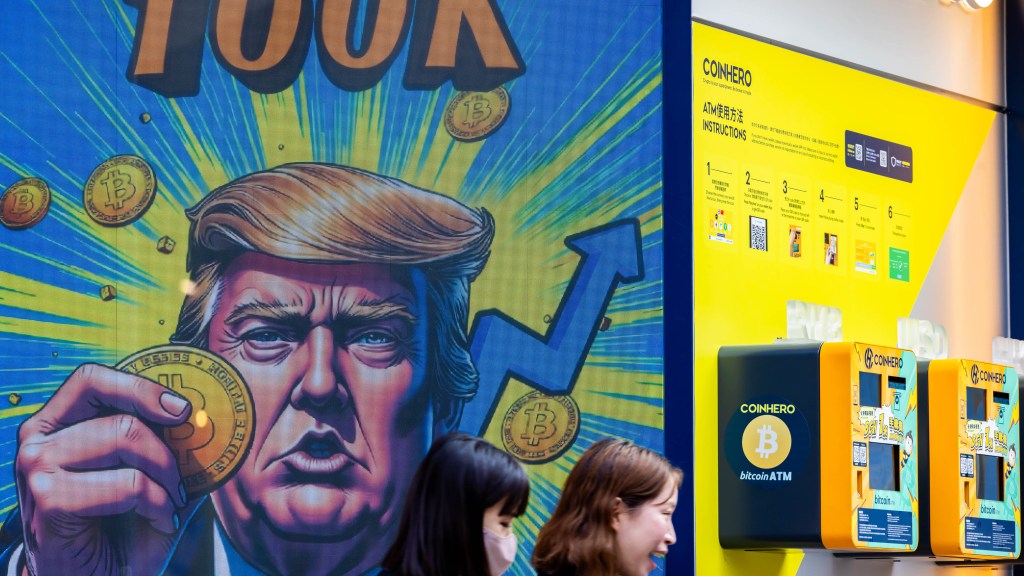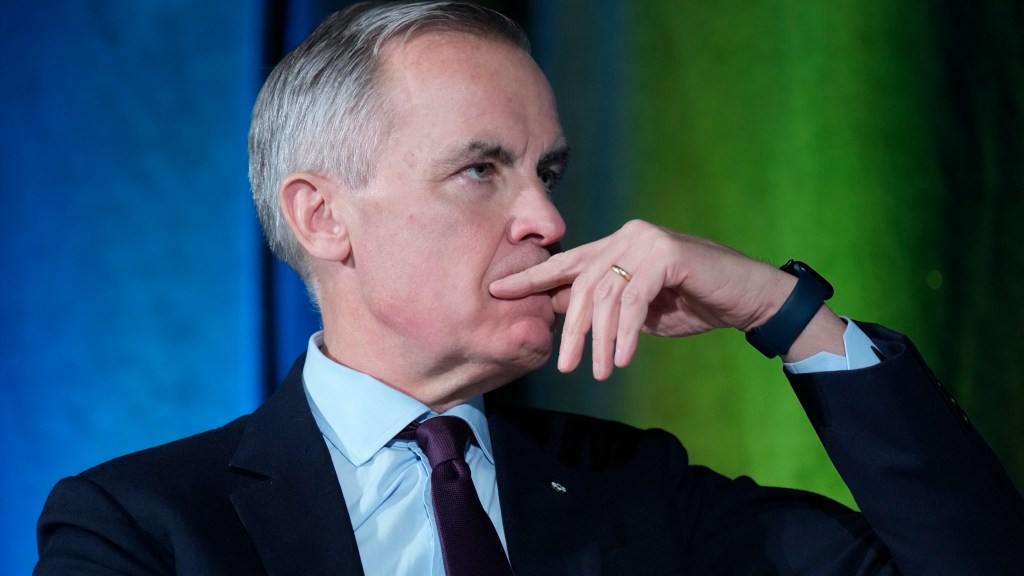Bitcoin Surpasses $100,000, Trump Claims Credit
Bitcoin has achieved a significant milestone, exceeding $100,000 for the first time, as anticipation builds around the potential influence of Donald Trump’s administration on the cryptocurrency market.
The leading cryptocurrency climbed to a peak of $103,335 on Thursday, prompting a celebratory message from the former president. “Congratulations bitcoiners!!! $100,000!!! You’re welcome!!! Together, we will Make America Great Again!” Trump expressed to his followers on Truth Social.
This year has seen bitcoin’s value more than double, with an increase of over 50 percent since Trump secured the presidency.
Initially skeptical about cryptocurrencies, Trump pledged to position the United States as the “crypto capital of the planet” during his campaign, planning to establish a “strategic reserve” of bitcoin.
His campaign actively accepted cryptocurrency donations and engaged with the crypto community at a bitcoin conference in July. Moreover, he initiated World Liberty Financial, a family venture focused on cryptocurrency trading, and indicated intentions to create a crypto advisory council.
Executives in the cryptocurrency sector are optimistic that Trump will advocate for significant legislative and regulatory reforms.
Trump has promised to dismiss Gary Gensler, the current chairman of the Securities and Exchange Commission (SEC) who has tightened regulations on the crypto industry, should he be elected. Gensler has stated that he plans to resign on the day Trump is inaugurated in January. On Wednesday, Trump nominated crypto supporter Paul Atkins as Gensler’s successor.
Atkins, who has previous experience as an SEC commissioner, played a role in shaping cryptocurrency policies as co-chairman of the Token Alliance, which aims to develop standards for digital asset issuance and trading.
Mike Novogratz, CEO of cryptocurrency firm Galaxy Digital, remarked, “We’re witnessing a paradigm shift. Bitcoin and the entire digital asset ecosystem are on the verge of becoming integral to the financial landscape. This momentum is driven by institutional engagement, advancements in tokenization and payment systems, and clearer regulations.”
Bitcoin was virtually worthless at its inception in 2008, being composed solely of computer code without a physical presence. It was created by the mysterious figure known as Satoshi Nakamoto, whose identity remains unknown.
Geoff Kendrick, global head of digital asset research at Standard Chartered, shared with Reuters, “At the end of the day, it’s just a number… but the reality is that we’ve reached this level because the industry is becoming more institutionalized this year. Approximately 3 percent of the total bitcoin supply that will ever exist has been acquired by institutional investors in 2024.”
This year has seen the launch of bitcoin exchange-traded funds (ETFs) by major financial firms such as BlackRock and Fidelity, although they are not yet available to UK investors.
Alongside bitcoin’s price surge, crypto-related stock prices have similarly soared. Since the election on November 5, shares of Coinbase Global, the largest U.S. cryptocurrency exchange, have surged by about 77 percent to $344, while MicroStrategy, a software company known for its bitcoin investments, has seen its stock rise 88 percent to $429.
Concerns persist regarding the role of cryptocurrencies in facilitating criminal activities worldwide. Recently, the U.S. and U.K. announced that they had dismantled a global money-laundering network utilizing cryptocurrency to assist wealthy Russians in evading sanctions and laundering money for drug traffickers.
Some market participants express skepticism about the broad integration of cryptocurrencies, including Bitcoin, into the financial system. Shane Oliver, chief economist at AMP, an Australian financial services firm, noted, “Over time, it’s proving itself as part of the financial landscape,” but also highlighted the difficulty in valuing such assets. He stated, “It’s anyone’s guess. However, it does have a momentum aspect to it, and at present, that momentum is upward.”
UK’s Reluctance on Cryptocurrency Contrasts with US Enthusiasm
Trump’s enthusiastic support for cryptocurrencies contrasts significantly with the UK authorities’ cautious approach to regulating digital tokens. The Financial Conduct Authority (FCA) continues to alert consumers to the potential risks, warning that they could lose their investments in bitcoin and other cryptocurrencies. Last month, the FCA provided a “road map” that indicates only authorized exchanges will be able to deal with crypto for professional investors by 2026. Mike Ringer, a financial services partner at CMS, described this timeline as “incredibly disappointing for the industry.” He revealed that the Treasury had previously aimed to introduce new legislation for stablecoins by 2024, which has since been postponed until 2026, dubbing it a substantial delay.
Trump’s recommendation of Paul Atkins, a long-time proponent of crypto, for the SEC leadership has sparked speculation about potential loosening of regulations. The U.S. has already moved ahead of the UK, permitting the launch of easily traded crypto-backed funds last year, attracting major firms like BlackRock and Fidelity Investments to the space. Regulators remain wary that cryptocurrencies may not only represent a speculative bubble but also serve as a vehicle for illicit activities. Charles Randell, the former FCA chair, compared crypto trading to “digital roulette,” cautioning that any regulatory measures might give investors a false sense of security. Currently, seven million individuals in the UK own cryptocurrencies, often through unregulated offshore exchanges such as Coinbase and Binance.




Post Comment